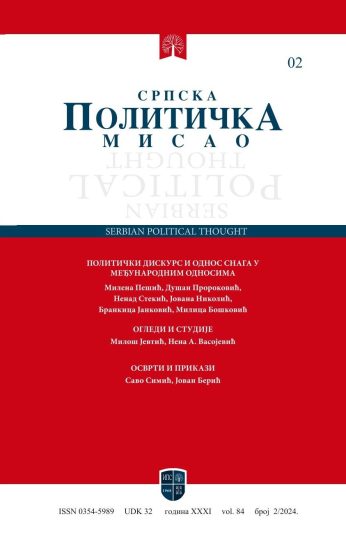Тема броја
ЕВРОПЕИЗАЦИЈА, ГЛОБАЛИЗАЦИЈА И ИДЕНТИТЕТ
ЕВРОПСКИ И НАЦИОНАЛНИ ИДЕНТИТЕТ У ПРОЦЕСУ ЕВРОПСКЕ ИНТЕГРАЦИЈЕ: НЕОФУНКЦИОНАЛИСТИЧКО ВИЂЕЊЕ
Сажетак
Аутор се у овом раду бави питањем националног и европског идентитета, које ће бити сагледано кроз призму неофункционалистичке теорије европске интеграције. У средишту анализе биће разматран начин на који је ова теорија повезала европски идентитет са процесом интеграције, и у ком светлу је сагледана важност националног идентитета. Аутор ће у чланку указати на неке недоследности и ограничености неофункционалистичке теорије, али и на покушаје њене ревитализације. Циљ рада је да одговори на питање да ли ова теорија, и поред многобројних оспоравања, може представљати одговарајући оквир за објашњење развоја европског идентитета. Рад ће бити подељен у два дела. У првом ће се разматрати неофункционалистичка теорија процеса европске интеграције, тј. њен начин сагледавања еволуције овог процеса. Други део ће се бавити питањем европског и националног идентитета из перспективе ове теорије, у циљу сагледавања оправданости ове теорије као одговарајућег оквира за објашњење развоја европског идентитета.
Референце
- Schmitter, Philippe, «Neo-neofunctionalism: déjà vu, all over again», www.eui.eu/ Documents/DepartmentsCentres/SPS/Profiles/Schmitter/NeoNeofunctionalismRev.pdf.
- Checkel, Jeffrey, «Social construction and integration», Journal of European Public Policy, 6, n° 4, 1999.
- Schimmelfennig, Frank, Rittberger, Berthold, «Theories of European Integration: Assumptions and Hypotheses», in Jeremy John Richardson, (ed.), European Union: power and policy making, 3rd edition, Routledge, London, 2006.
- Collester, Bryan, «How Defense «Spilled Over» Into the CFSP: Western European Union (WEU) and the European Security and Defense Identity (ESDI)», in Maria Cowles Green, Michael Smith (eds.), The State of the European Union, 5, n° 1, 2001.
- Diez, Thomas, «Europe as a Discursive Battleground: Discourse Analysis and European Integration Studies», Cooperation and Conflict, 36, n° 1, 2001.
- Diez, Thomas, Wiener, Antje, «Introducing the Mosaic of Integration Theory: Its Past, Present and Future», www.unimuenster.de/Politikwissenschaft/Doppeldiplom/docs/IntT.pdf
- Etzioni, Amitai, Political Unification Revisited. On Building Supranational Communities, Lanham, Lexington, 2001.
- Forsberg, Tuomas, «Explaining the Emergence of the ESDP: Setting the Research Agenda», Paper Prepared for the European Consortium for Political Reasearch (ECPR), Standing Group for International Relations (SGIR) Conference, Turin, September 12-15, 2007.
- Haas, Ernst B, «Does Constructivism Subsume Neo-functionalism?», in Thomas Christiansen, Knud Erik Jorgensen, Antje Wiener (eds.), The Social Construction of Europe, Sage, London, 2001.
- Haas, Ernst B, «International Integration: The European and the Universal Process», International Organization, 15, n° 3, 1961.
- Haas, Ernst B, The Uniting of Europe: Political, Social and Economic Forces 1950-57, Stanford University Press, Stanford, 1958.
- Hiks, Sajmon, Politički sistem Evropske unije, Službeni glasnik, Beograd, 2007.
- Hooghe, Liesbet, Marks, Gary, «A Postfunctionalist Theory of European Integration: From Permissive Consensus to Constraining Dissensus», British Journal of Political Science, 39, n° 1, 2009.
- Laffan, Brigid, «The European Union and its institutions as «identity builders»; in Richard K. Herrmann, Thomas Risse-Kappen, Marylinn Brewer (eds.), Transnational Identities. Becoming European in the EU, Lanham MD, Rowman&Littlefield, 2004.
- Lequesne, Christian, «La Commission européenne entre autonomie et dépendance», Revuefrançaise de science politique, 46, n° 3, 1996.
- Macmillan, Catherine, «The Application of Neofunctionalism to the Enlargement Process: The Case of Turkey», Journal of Common Market Studies, 47, n° 4, 2009.
- Niemann, Arne, Explaining Decisions in the European Union, Cambridge University Press, Cambridge, 2006.
- Risse, Thomas, «Nationalism and Collective Identities: Europe versus Nation-State?», in Paul Heywood, Eric Jones, Martin Rhodes (eds.), Developments in West European Politics 2, Palgrave Macmillan, New York, 2002.
- Risse, Thomas, «Neofunctionalism, European identity, and the puzzles of European integration», Journal of European Public Policy, 12, n° 2, 2005.
- Risse-Kappen, Thomas, «Exploring the Nature of the Beast: International Relations Theory and Comparative Policy Analysis Meet the European Union», Journal of Common Market Studies, vol. 34, n° 1, 1996.
- Rosamond, Ben, Theories of European Integration, Palgrave, New York, 2000.
- Schmitter, Philippe, «Ernst B. Haas and the legacy of neofunctionalism», Journal of European Public Policy, 12, n° 2, 2005.
- Стојадиновић, Миша, «Изазови политичких система на Балкану», Српска политичка мисао, вол. 28, бр. 2, 2010.
- Stone Sweet, Alec Sandholtz, Wayne, «European Integration and Supranational Governance», Journal of European Public Policy, 4, n° 3, 1997.
- Tranholm-Mikkelsen, J, «Neofunctionalism: Obstinate or Obsolete?», Millennium: Journal of International Studies, vol. 20, n° 1, 1991.
- Пешић, Милена, Новаковић, Александар, «Проблем идентитета и мултикултурализам», Српска политичка мисао, вол. 28, бр. 2, 2010.
- Vukcevic, Dejana, L’émergence d’une Europe de la défense: difficultés et perspectives, Editions universitaires européennes, 2010.

